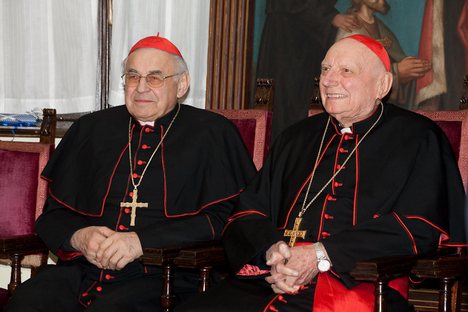
- Order:
- Duration: 0:41
- Published: 2008-12-26
- Uploaded: 2010-11-04
- Author: gabaedu
these configurations will be saved for each time you visit this page using this browser
A curia in early Roman times was a subdivision of the people, i.e. more or less a tribe, and with a metonymy it came to mean also the meeting place where the tribe discussed its affairs. Etymologically it is derived from the Old Latin term "co-viria," literally an "association of men." This archaic pronunciation - note that in Classical Latin "v" is always pronounced as "w" - eventually evolved into the more recognizable word.
The curia per antonomasia was the Curia Hostilia in Rome, which was the building where the Senate usually met. The Senate, initially just a meeting of the city elders from all tribes (its name comes from "senex", which means "old man"), saw its powers grow together with the conquest that brought a town of humble origins to rule a large Republic (and then decrease steadily with the advent of the Empire).
During their expansion, the Romans exported the model to every city that gained the status of Municipium, so that it had its own Senate and its own officials charged with local administration (although they weren't usually elected but nominated by the central government; the only place where officials were actually elected by the people was Rome itself, and by Imperial times even those elections, although kept for the sake of tradition, had no more significance). Senators themselves were not elected since the early Republic, having been transformed into a hereditary nobility.
During the late Roman Empire, the government assumed a dual character, secular and religious. The fall of the Western Roman Empire ended the secular curia, but not the religious one, which has continued to the present day.
Category:Ancient city of Rome Category:Ancient Rome Category:Roman law
This text is licensed under the Creative Commons CC-BY-SA License. This text was originally published on Wikipedia and was developed by the Wikipedia community.



















































![Klis Fortress (Croatian: Tvrđava Klis) is a fortress located near the city of Split, in central Dalmatia, Croatia. For centuries, Klis Fortress served as a major source of defense in Dalmatia, especially against the Ottoman advance.[2] From a small stronghold built by Illyrians, a royal castle that has been the seat of many Kings of Croatia, to a large fortress during the Ottoman wars in Europe, Klis Fortress has long guarded the frontier, being lost and re-conquered several times throughout its Klis Fortress (Croatian: Tvrđava Klis) is a fortress located near the city of Split, in central Dalmatia, Croatia. For centuries, Klis Fortress served as a major source of defense in Dalmatia, especially against the Ottoman advance.[2] From a small stronghold built by Illyrians, a royal castle that has been the seat of many Kings of Croatia, to a large fortress during the Ottoman wars in Europe, Klis Fortress has long guarded the frontier, being lost and re-conquered several times throughout its](http://web.archive.org./web/20110113170637im_/http://cdn.wn.com/pd/a0/b5/a65d2f89ac67f2b74786f653e44a_grande.jpg)
















